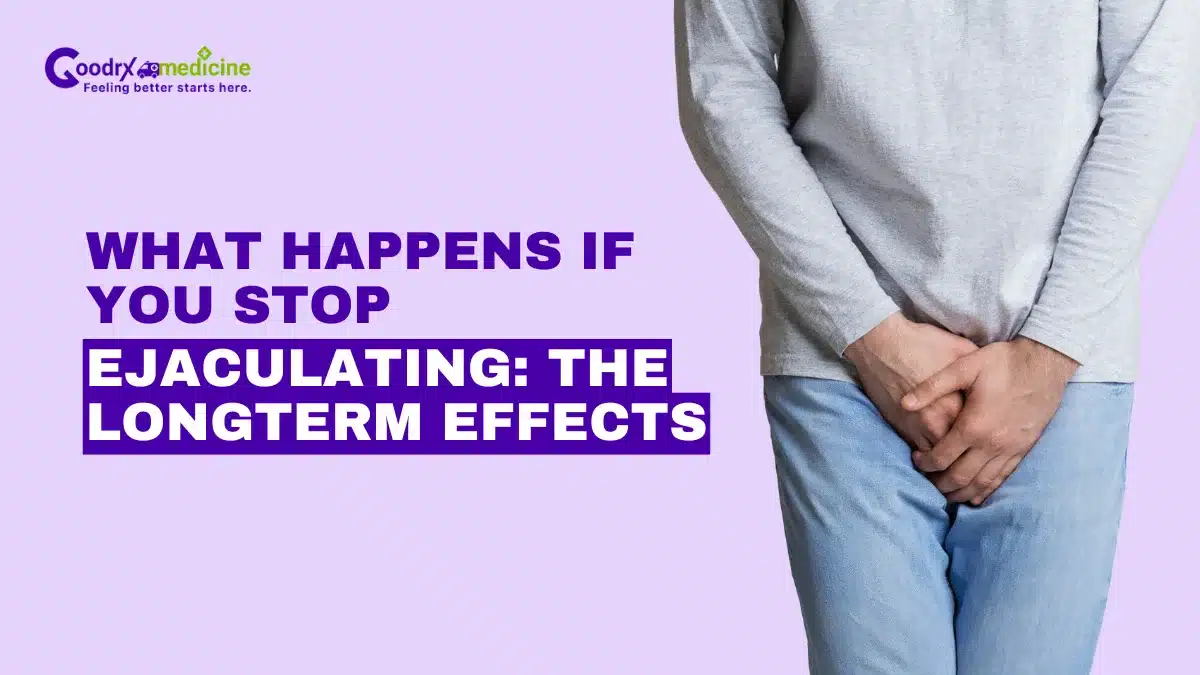Ejaculation is a bodily discharge that consists of sperm and seminal fluid, often vital for fertility and satisfactory sexual intercourse for both partners. Semen retention or ejaculatory abstinence, on the other hand, is the practice of avoiding ejaculation either by avoiding sexual intercourse or achieving orgasm without ejaculation.
While some ancient philosophers believe semen retention is essential for mental, physical, and spiritual well-being, what happens if you stop ejaculating for a long time?
A man may stop ejaculating either intentionally or it may occur due to some health conditions. But are there any potential benefits or side effects of not ejaculating? And how many times should a man ejaculate to acquire health benefits?
This article discusses these important questions regarding stopping ejaculation, its significance, side effects, frequency, and other less-discussed topics.
Why does a man stop ejaculating
Before learning about what happens if you stop ejaculating, let’s briefly discuss why a man opts to avoid ejaculation during sexual intercourse. While it may include your specific preferences to prevent ejaculation, for others, it might happen due to underlying health conditions or medicinal side effects.
Here are 8 reasons why a man stop ejaculating:
1. Edging
Some men may intentionally choose to prevent ejaculation. It usually happens if you want to attempt multiple orgasms without ejaculating or if you want to delay ejaculation to avoid Premature Ejaculation (PE). While there can be numerous causes of PE, you can take prescribed Super P Force Pills to treat quick and unwanted discharge.
2. Ejaculation problems
Some ejaculation problems in men, such as Delayed Ejaculation (DE) and Retrograde Ejaculation (RE), are also significant reasons why a man stops ejaculation. In DE, the ejaculation does not occur at a reasonable time. In contrast, in RE, the semen or sperm enters the bladder instead of coming out of the penis.
3. Anejaculation
Anejaculation is a condition when a man is unable to ejaculate. Man with this condition often produces sperm and has orgasms; however, they are still unable to ejaculate.
4. Age
Some men may stop ejaculating if they reach a certain age. As they reach their 40s or 50s, they may face difficulties in ejaculating.
5. Medications
Certain medications, such as high blood pressure medicines, water pills (Diuretics), and antidepressants, may increase the risks of Delayed Ejaculation. If you experience any change in your ejaculation after starting a medicine regimen, consult your doctor and seek treatment.
6. Physical issues
Damage to the nerves, blockage in the ducts, infections, and undeveloped Vas Deferens may also cause certain ejaculation problems in men. Sometimes, Erectile Dysfunction (ED) can be a cause for your low desire to ejaculate. You can take prescribed generic Viagra, Tadalafil 20, and Vidalista 80 for a faster recovery and enhanced sexual experience.
7. Psychological problems
Psychological problems, such as high stress, Anxiety, and Depression, may hinder your ability to ejaculate on time and increase the risks of Delayed Ejaculation.
8. Lifestyle changes
Excessive alcohol consumption, improper diet, obesity, stressful conditions, and smoking may also prevent ejaculation.
What happens if you stop ejaculating
If you stop ejaculating, your body may go through certain hormonal, physical, and psychological changes. The table below briefly shows the changes that happen if you block sperm from coming out for a week, month, three months, or more:
| Aspects | A week | A month | Three months | More than three months |
| Sperm count | Slightly increases | Increases | Sperm accumulates to be reabsorbed by the body | Sperm accumulates but later gets reabsorbed |
| Sexual tension | Increases | Sexual desire may intensify | More intense | Sexual desire may increase or decrease |
| Testosterone levels | There is a slight and temporary increase | Temporary rise but returns to normal levels | It is likely to spike but return to normal levels | Increases temporarily but stabilizes after some time |
| Mood swings | Irritation due to accumulated sexual tension | May cause irritation | Either high focus or irritation and frustration | Emotional stability or mood swings may occur |
| Prostate health | No effect | No effect | No significant negative impact | High risks of prostate problems, such as Prostatitis and Prostate Cancer |
| Possible benefit | No effect | Heightened focus and energy | Enhanced sexual sensitivity, libido, self-control | Mental clarity and sexual sensitivity increases |
| Possible discomfort | No effect | Blue balls or Epididymal Hypertension | Low sexual desire or libido over time as the body adjusts | Sexual Dysfunction, such as Erectile Dysfunction or difficulty reaching climax |
Benefits of not ejaculating
Some semen retention benefits for men are as follows:
- Reduce Anxiety and stress: Not ejaculating for a shorter duration of time may improve your mental health and enhance concentration
- Increases sperm motility: A short-term semen retention may significantly improve sperm motility
- Improves fertility: Shorter semen retention for up to 2 days has higher chances of conception compared to longer semen retention
- Increases testosterone levels: Your testosterone may rise by up to 145.7% baseline testosterone levels on stopping ejaculating for a short duration
Furthermore, semen retention also increases sexual energy, improves concentration, and enhances self and ejaculatory control and discipline. It also maintains a healthy heart, burns calories, and helps you get multiple orgasms without ejaculating.
Common side effects of not ejaculating

While stopping yourself from ejaculating may provide some benefits in the initial duration, it often causes specific side effects if continued for longer. Here are some of the side effects of not ejaculating for a longer duration:
- Increased risks of Prostate Cancer: Frequent ejaculations may naturally flush out the harmful chemicals built into your semen and maintain your prostate health. On the contrary, if you stop ejaculating for a long time, your risk of developing Prostate Cancer increases
- Changes in semen consistency: Prolonged semen retention may increase semen volume and sperm count. However, it may turn semen thick and affect your conception (fertilization) rates
- Pain and discomfort: When you are sexually aroused, more blood flow to your penis and helps you achieve a firm erection. However, if you prevent ejaculation, blood drains slowly from your male organ and causes pain
- Low sperm quality: Prolonged delaying of ejaculation may affect the quality of your sperm. It can make sperm less motile and less compatible with conception
- Sleep disruptions: Not ejaculating for a long time may also cause sleep disruptions in some men
- Increased sexual Anxiety: If you stop ejaculating for a long time, you may feel frustrated or irritated
- Infertility: Your semen contains sperm and seminal fluid that helps in conception. If you prevent ejaculation, it may result in infertility
Furthermore, in some cases, semen retention may cause sexual tensions between you and your partner and affect the quality of your relationship. Therefore, it is essential to communicate with your partner before making any decision.
How often should a man ejaculate

While how often a man should ejaculate is not fixed, ejaculation does provide certain benefits to a man in the long term. The frequency of ejaculation in a week or month significantly depends on your age, health condition, and sexual stimulation.
However, a 2016 study found that men who ejaculate 21 times or more a month have a 20% less chance of developing Prostate Cancer compared to men who ejaculate only 4-7 times a month.
Moreover, when trying to conceive, a man should ejaculate every two to five days a week to increase the chances of fertilization. It is because the normal lifespan of a spem is around five days. However, as the day passes, the sperm becomes less functional due to prolonged storage.
At what age does a man stop ejaculating
There is no set age at which a man stops ejaculating. However, in many men, ejaculation may stop as they reach their 40s and 50s. While it may happen naturally, in some rare cases, it may occur due to health conditions.
It is essential to maintain a healthy weight, quit smoking, reduce alcohol consumption, eat a balanced diet, and seek proper medical treatment to reclaim sexual intimacy. Consult your doctor today and regain the lost intimacy.
Conclusion
Ejaculation is an important aspect that ensures satisfactory sexual intercourse and fertility rates. However, some men choose to prevent ejaculation. But if you wonder what happens if you stop ejaculating, it has its own benefits and side effects.
You may choose to stop ejaculating if you want to delay ejaculation, have ejaculatory problems, have a medical condition, or have lifestyle reasons. Short semen retention has certain benefits, such as increased testosterone levels, improved sperm motility and fertility, and reduced sexual Anxiety.
However, semen retention for a longer duration may cause specific side effects, such as pain, sperm degradation, infertility, sleep disruptions, and higher risks of Prostate Cancer. At the same time, there is no set stone for the frequency of ejaculation. However, men who ejaculate 21 times or more in a month are less likely to develop Prostate Cancer.
Frequently Asked Questions
In the absence of ejaculation, what happens to sperm?
In the absence of ejaculation, the unused sperm decomposes and is reabsorbed into the body. A short-term absence of ejaculation may provide certain benefits, such as increased sperm count and a slight increase in testosterone levels. However, the results may vary for the long-term absence of ejaculation.
Can not ejaculating cause prostate problems?
Yes, not ejaculating for a long time may increase the risks of Prostate Cancer in men. However, frequent ejaculation may have prostate health advantages. Not ejaculating lowers the risk of Prostatitis and the chance of acquiring certain prostate disorders such as Prostate Cancer.
Does not ejaculating affect libido?
Yes, not ejaculating may affect your libido. Abstaining from ejaculation or reducing sexual activity may affect desire, but individual experiences vary widely. Some people may experience a transient increase in libido when abstaining, while others may experience a reduction.
Is it better to stop ejaculating?
Yes, short-duration semen retention may be beneficial due to increased semen volume, sperm count, sexual energy, and testosterone levels. However, if you stop ejaculating for a long time, you may experience risks of Prostate Cancer, increased sexual Anxiety, low sperm quality, pain, discomfort, and sleep disruptions.
What happens to the body when you stop ejaculating?
When you stop ejaculating for a shorter time, your testosterone level and sperm motility increase. You may also feel less sexual Anxiety, and your focus and concentration are enhanced. However, if you stop ejaculating for a long time, you may increase your risk of developing Prostate Cancer.
When referencing outside resources, GoodrxMedicine always provides full citations. To learn more about the measures we use to maintain the quality of our content, please review our Content Information Policy.















